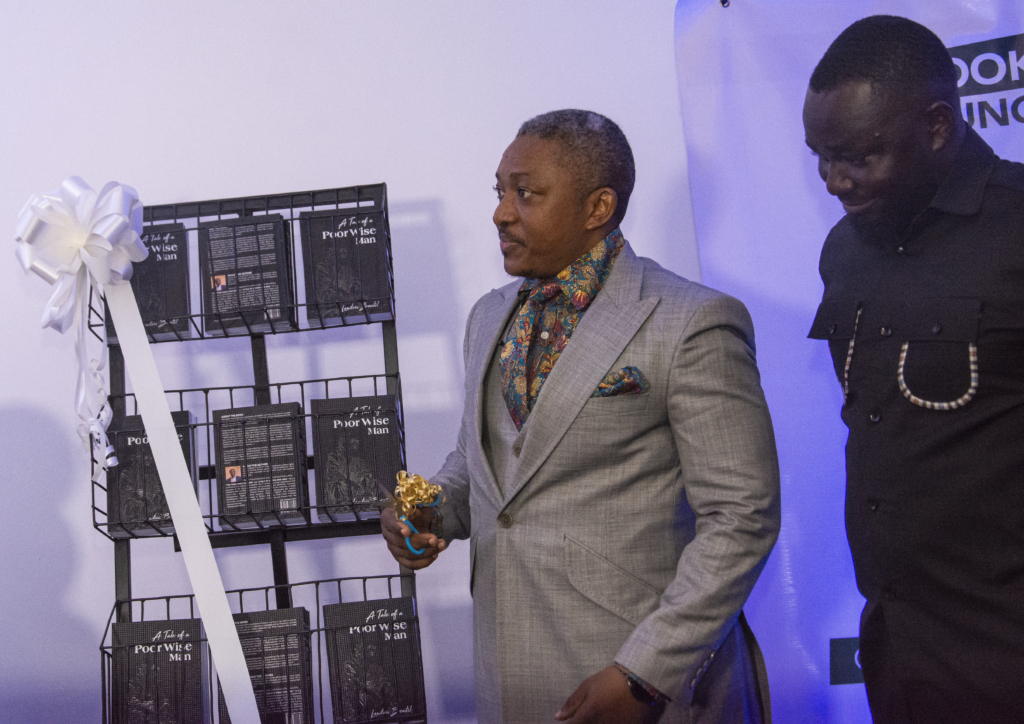Author Lawton Bentil has launched his latest book, "A Tale of a Poor Wise Man," on Sunday, August 4.
This compelling satire delves into the themes of personal leadership and the continent of Africa, offering a poignant commentary on the nature of wisdom and its application.
The book centers around Asiedu, a protagonist endowed with profound wisdom that is evident through the counsel he provides.
However, despite his insightful advice, Asiedu is financially destitute, with three wives, eleven children, and no properties or farmlands.

This paradox serves as a central theme in Mr Bentil’s narrative.
Set in the meticulously fictionalised village of Bibiman—translated to mean "Africa" in English—the story uses this symbolic location to critique a certain type of wisdom prevalent in the continent. Bentil tactically employs Bibiman to denote the geographical setting of this wisdom, which, despite its depth, lacks practical application and tangible results.
The book narrates the story of Bibiman, a city besieged and its inhabitants held captive, which Asiedu saves through his wisdom. However, the subsequent disregard of his counsel underscores a recurring fate for the wisdom of the impoverished.

Mr. Bentil emphasizes that true wisdom is not merely intellectual but should manifest in tangible outcomes, such as financial stability and generational wealth.
In a powerful message to his sons, Asiedu advises, "While you live, make full proof of yourself. Make sure you die empty, make sure you are not called a poor man. Work hard and be consistent at it. Buy lands and properties. Make sure you leave an inheritance for your children's children. Wisdom is good, but wisdom is even better with an inheritance. Learn and be wise. Follow instructions and be honest."
"A Tale of a Poor Wise Man" underscores the unfortunate reality that the wisdom of the socially or economically disadvantaged is often undervalued or ignored. The book ultimately encourages individuals to strive not only for wisdom but also to use it to improve their lives and secure a prosperous future for subsequent generations.
Opanyin Afriyie’s poignant observation, "Nevertheless, the poor man's wisdom is always despised, and his words are not heard," encapsulates the book's core message and serves as a reflective conclusion to this thought-provoking tale.

Lawton Bentil’s new book promises to be an insightful read, blending satire with a deep exploration of wisdom and its real-world implications.
Latest Stories
-
Alan Kyerematen’s ‘Brighter Future for Health Professionals’ in Ghana Revealed in Bono
10 mins -
NPP will ensure a safer cleaner and greener environment – Dr Kokofu
18 mins -
2024 Election: Police to deal with individuals who will cause trouble – IGP
19 mins -
Seychelles President’s visit rekindles historical and diplomatic ties with Ghana
25 mins -
Election 2024: EC destroys defective ballot papers for Ahafo and Volta regions
35 mins -
2024 Election: I am sad EC disqualified me, but I endorse CPP’s candidate – PNP’s Nabla
1 hour -
I want to build a modern, inclusive country anchored by systems and data – Bawumia to CSOs
1 hour -
Miss Health Ghana 2024: Kujori Esther Cachana crowned new Health Ambassador
1 hour -
Livestream: The manifesto debate on WASH and climate change
1 hour -
Alan Kyerematen saddened by NDC and NPP’s neglect of Krofrom Market in the Ashanti Region
1 hour -
CSIR Executive Director urges farmers to adopt technology for improved farming
2 hours -
Football Impact Africa’s Ghetto Love Initiative inspires change in Teshie
2 hours -
Peter Toobu calls for tighter border security over uncovered weapons at Tema Port
2 hours -
Gov’t has failed its commitment to IPPs – Ablakwa
2 hours -
Sell Chrome to end search monopoly, Google told
2 hours

